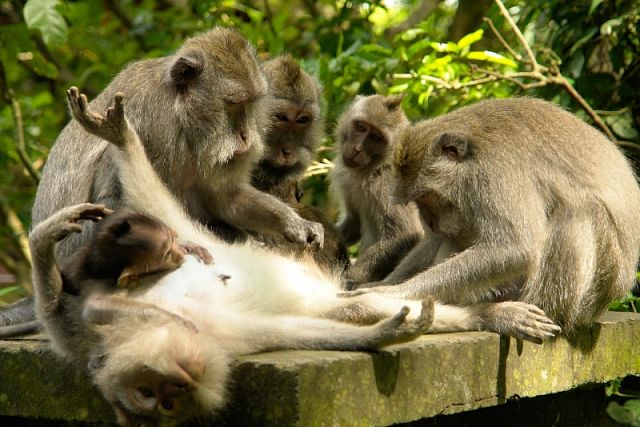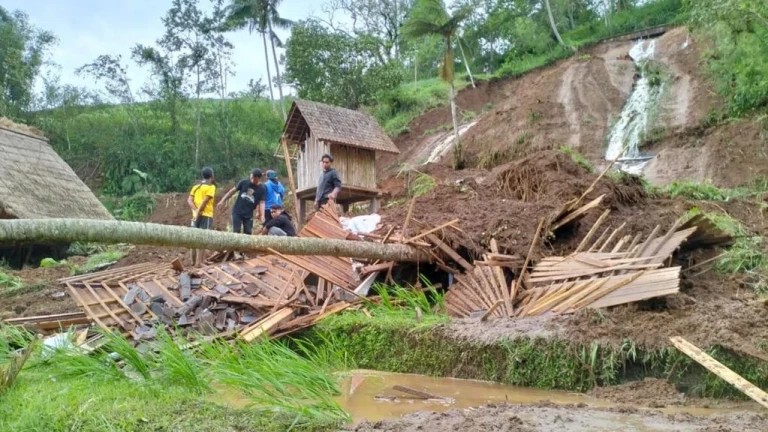
Bali appears to have lost one of its most popular tourist attractions. Following a tragedy at the Monkey Forest that claimed the lives of two foreign visitors, the park in central Ubud has been closed indefinitely.
A staff member explains the situation to confused visitors who had come to see the monkeys:
“On Tuesday, a large tree fell and killed two tourists,” he says with a somber expression, pointing to the culprit. “There’s the tree.”
Across the road from the main exit, the massive “killer tree” lies on the ground. Some of its branches have already been cut off, but its size is still intimidating. A storm had uprooted it completely.
Police officers stand by the site, while the monkeys are nowhere to be seen—they’ve likely retreated deeper into the park, either due to the rain or the commotion that followed the incident.
The only people allowed into the Monkey Forest today are workers. They’ve brought in excavators and are laying concrete structures underground. How this will help stabilize the roots of century-old trees remains unclear.

Meanwhile, Monkey Forest has issued an official statement on its website:
“We deeply regret the tragedy caused by strong winds in the Monkey Forest area. We want to emphasize that the fallen tree was completely healthy. We regularly monitor and prune trees as part of our commitment to ensuring the safety of visitors, staff, and wildlife in the Monkey Forest in Ubud.”
On Tuesday, a massive tree fell in the Monkey Forest due to strong gusts of wind. Most visitors in the vicinity managed to move to a safe distance, but two people were tragically killed. The victims were Justine Christine, 32, from France, and Kim Hyun, 42, from South Korea. Another individual, who was critically injured, was taken to a local hospital and is now in stable condition. Five others sustained minor injuries.
The general manager of the Monkey Forest in Ubud, Anak Agung Bagus Bhaskara, announced that the families of the victims and the injured would receive insurance payouts, and the park administration is committed to supporting the families in any way possible.
“We are working with an insurance company, and the compensation ranges from 100 million to 1 billion Indonesian rupiah. The family of the victim from Korea is expected to arrive in two days, and we are still awaiting updates from the family of the victim from France.”

On Thursday, a religious ceremony was held at the site of the tragedy. The head of the traditional village of Padangtegal, Ubud, I Made Parmita, explained that a Pekaruan ritual took place at the Pura Wana Temple:
“We hope this ceremony will neutralize negative energy, and we pray that such a disaster will not happen again,” he said. Earlier, a Prayaschita ceremony had already been performed at the site.
According to Balinese Hindu tradition, the Pekaruan ceremony is necessary to cleanse the area of malevolent forces and calm the negative energies present. It is believed that if these energies are not addressed, similar incidents could occur. The ceremony is typically closed to the public.
The Prayaschita ceremony consists of four stages: purification, atonement, cleansing, and preparation of the site for the Pekaruan ceremony, which concludes the process.
Meanwhile, the Monkey Forest administration has outlined additional safety measures beyond spiritual rituals:
“We already have a conservation team actively caring for the trees and providing visitors with weather updates. Currently, the Monkey Forest remains temporarily closed, and we cannot confirm when it will reopen.”

The regional secretary of Gianyar, Dewa Gede Alit Mutiara, along with Gianyar’s head of tourism, Wayan Gede Sedana Putra, visited the site of the tragedy. “This is an unavoidable disaster, but we guarantee that the victims will receive the best possible assistance,” they stated.
Over the past three days, Bali’s Disaster Mitigation Agency has reported more than 50 incidents, ranging from fallen trees to landslides and floods. BaliForum has issued warnings for tourists to stay vigilant and seek shelter in safe locations during bad weather.
Local residents have already labeled this year’s rainy season in Bali as one of the most intense in recent years.
Sources: JakartaGlobe, Kompas.id


You can add one right now!